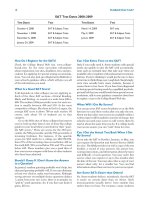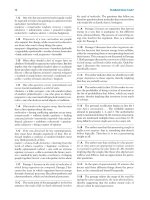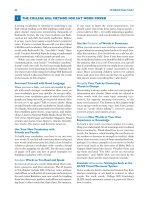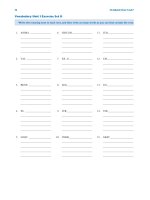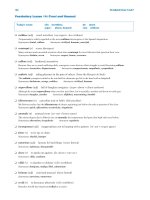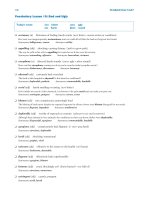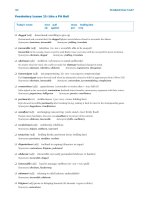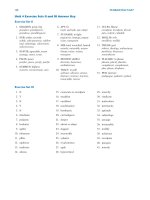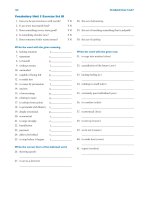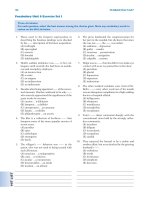Sat - MC Grawhill part 23 ppt
Bạn đang xem bản rút gọn của tài liệu. Xem và tải ngay bản đầy đủ của tài liệu tại đây (158.08 KB, 10 trang )
210 MCGRAW-HILL’S SAT
Lesson 1:Verbal Inference
What Are Sentence Completion
Questions?
Now look at Question 2: Since we became trepin-
dant after running around the cregiendo, the word tre-
pindant describes human beings, and perhaps other
animals that can run, rather than, say, rocks. It also
seems to describe a temporary state rather than a per-
manent trait, since we weren’t trepindant before we
started running around. What would make us col-
lapse in a heap? Exhaustion, of course. So trepindant
probably means exhausted, which big objects like
cregiendos could never be.
Attacking the Questions
Always reread the sentence with your selected
response to check it. Too many students forget
this simple step. Rereading helps you to avoid
overlooking anything important. Check that
the logic and the tone make sense.
Consider the following sentence:
As part of our game, we ran twice around the
cregiendo until we became so trepindant that we
collapsed in a heap on the porch.
Is the word cregiendo a noun, a verb, or an adjective?
How about trepindant? Since they are nonsense words,
you could not have known the answer to those ques-
tions before reading this sentence. After reading it,
though, you should have some idea about what
cregiendo and trepindant might mean. Cregiendo must
be a noun because it’s the thing we ran around, and tre-
pindant must be an adjective because it describes us
after we ran around the cregiendo. With your vast ver-
bal inference skills, you’ve probably figured out more
than just the part of speech of cregiendo and trepindant.
Try these questions:
1. A cregiendo is about as big as (A) a spider
(B) a pillow (C) a car (D) a house (E) a village.
2. Can a cregiendo be trepindant?
Even the world’s smartest and most powerful com-
puters find these kinds of questions very, very tough.
It’s easier to program a computer to become a chess
grandmaster or to predict hurricanes than to answer
such “common-sense” questions. Common sense
seems simple, but this simplicity is deceptive. So revel
in your brilliance!
Look at Question 1: A cregiendo is something that
kids can run around, but running around it twice
causes you to collapse. Your common sense tells you
that such a thing would be roughly as big as a house.
A village is way too big to run around in a game, and
the other things are much too small to exhaust you.
Example:
Although these animals migrate, they are
not ; they remain loyal to their estab-
lished ranges and seldom stray into new areas.
(A) predators (B) burrowers
(C) grazers (D) scavengers
(E) wanderers
Don’t worry about the choices yet, just read the sen-
tence. These animals seldom stray, so they must not
be wanderers. It’s possible that they are not predators,
or burrowers, or grazers, or scavengers also, but the
sentence doesn’t provide any information about those
traits. Your choice should be (E).
Check Your Work
Attack Sentence Completion questions system-
atically: (1) Read the entire sentence, saying
“blank” in place of the missing words. (2) Think
about the logic of the sentence. (3) Complete the
sentence with your own words. (4) Scan through
the choices and look for a match. (It probably
won’t be an exact match; pick the closest
choice.)
Every SAT will contain about 20 Sentence
Completion questions as part of the Critical
Reading portion of the test. These questions
test your verbal inference skills. Your verbal in-
ference skills are the skills you use to figure out
the meaning and usage of an unfamiliar word
when you read or hear it in a sentence.
CHAPTER 5 / SENTENCE COMPLETION SKILLS 211
Concept Review 1: Verbal Inference
1. What is “verbal inference”?
2. What should you do before trying to complete a Sentence Completion question?
Read the following sentences, think about them, then answer the questions about the nonsense words.
Far from being an arnacular pastime, numismatics, or the study of currency, can purnade our appreciation
of the history and economic development of a nation.
3. Arnacular is (A) a verb (B) a noun (C) an adjective (D) an adverb (E) a preposition (F) a pronoun.
4. Can a person be arnacular?
5. Arnacular most nearly means (A) invalid (B) obsessive (C) aimless (D) interesting (E) foreign (F) dangerous.
6. Purnade is (A) a verb (B) a noun (C) an adjective (D) an adverb (E) a preposition (F) a pronoun.
7. Is purnading our appreciation of something probably a good thing or a bad thing?
8. Purnade most nearly means (A) undermine (B) complicate (C) heighten (D) clarify (E) ignore (F) adore.
Car buyers, when given a choice of engines, will typically choose the most powerful and gas-guzzling option,
refuting the popular belief that fellinance is the primary concern of consumers.
9. Fellinance is (A) a verb (B) a noun (C) an adjective (D) an adverb (E) a preposition (F) a pronoun.
10. Are all car engines fellinant?
11. Is fellinance more likely to be associated with a small sedan or a large pickup truck?
12. Fellinance most nearly means (A) longevity (B) continuity (C) propriety (D) efficiency (E) luxury.
SAT Practice 1: Verbal Inference
212 MCGRAW-HILL’S SAT
6. Some contend that the quatrains of Nostradamus
events that would not take place for cen-
turies, including like wars, conflagrations,
and earthquakes.
(A) foreboded . . cataclysms
(B) mitigated . . marvels
(C) impersonated . . myths
(D) transcended . . auguries
(E) disrupted . . coincidences
7. While the script for the movie consummately de-
picted the wit and charm of Oscar Wilde, the in-
competent actor portraying him mutilated the
most lines.
(A) tactless
(B) sober
(C) ingenious
(D) unintelligible
(E) unnecessary
8. Rather than the attitude of the entire com-
munity from that of a few individuals, she was
willing to concede that there were many conflict-
ing opinions on the matter.
(A) distinguishing
(B) concealing
(C) protecting
(D) inferring
(E) expelling
9. For all Nick’s at the office, his close friends
knew that this trait his true contemplative
and introspective nature.
(A) bluster . . belied
(B) pomposity . . determined
(C) sarcasm . . revealed
(D) presumptuousness . . emphasized
(E) shallowness . . bolstered
1. Although he clearly was obsessed with the
of moral perfection, he was also aware of its
potential : self-righteousness, arrogance, and
condescension.
(A) pursuit . . pitfalls
(B) likelihood . . dangers
(C) contemplation . . insights
(D) morality . . tenets
(E) sanctity . . inequities
2. Whereas Gerald was always the frivolous one,
Bernard felt compelled to compensate for his
brother’s indiscretions by exercising profound
moral
(A) hysteria
(B) embarrassment
(C) prudence
(D) acceptance
(E) equivocation
3. In need of a from persecution, many young
refugees wandered far from their homeland
seeking communities in which to settle.
(A) nightmare . . just
(B) haven . . tolerant
(C) plight . . magnanimous
(D) pledge . . malevolent
(E) sanctuary . . invidious
4. The synthesized voices from today’s computer-
ized machines are a far cry from the sounds
of older machines; rather, they sound almost like
real human speech.
(A) melancholy
(B) cordial
(C) fervid
(D) inflammatory
(E) mechanical
5. Even in communities that value , investment
in technologically advanced industries can be an
important source of
(A) progress . . prestige
(B) liberty . . concern
(C) competition . . decay
(D) tradition . . income
(E) profits . . dismay
For more resources you can use on the Internet to help you practice your Sentence Completions, visit our Online Practice
Plus at www.MHPracticePlus.com/SATverbal.
CHAPTER 5 / SENTENCE COMPLETION SKILLS 213
Answer Key 1:Verbal Inference
6. (A) a verb
7. Probably good, because studying usually helps
you to appreciate things, rather than the opposite.
8. (C) heighten
9. (B) a noun
10. No. Since buyers can choose between engines with
fellinance or without it, it must not be universal.
11. A small sedan. Since fellinance is not a quality of
powerful and gas-guzzling engines, it is more
likely a quality of smaller engines.
12. (D) efficiency
Concept Review 1
1. The ability to determine the tone, meaning, and
usage of unknown words when they are read or
heard in context.
2. Read the entire sentence, saying “blank” when you
encounter a missing word; think about the overall
meaning of the sentence; and try to complete it
with your own words before checking the choices.
3. (C) an adjective
4. Probably. Words that describe pastimes, like fun,
popular, or dangerous, can often be used to de-
scribe people.
5. (C) aimless
SAT Practice 1
1. A The colon introduces examples. What are self-
righteousness, arrogance, and condescension ex-
amples of? Certainly not something good! So
insights and tenets (core beliefs) don’t make sense.
The likelihood of perfection doesn’t have dangers,
the sanctity of perfection doesn’t have inequities
(unequal treatments), but the pursuit of perfection
can certainly have pitfalls (negative consequences)
like those listed.
contemplation = deep thought; sanctity = holiness
2. C Whereas indicates a contrast. Frivolous means
lacking soberness or seriousness. The missing word
has to indicate a quality that a serious person
would have, like prudence (conservative wisdom).
hysteria = irrational and excessive emotion;
equivocation = failure to commit to a position
3. B Refugees are people in search of safety, usually
from war. They wouldn’t seek malevolent (ill-
wishing) or invidious (causing resentment) com-
munities. They are not in need of a nightmare or a
plight (difficult situation). The only choice that
makes sense indicates that they are seeking a
haven (safe place) from persecution in a tolerant
community.
just = proper and righteous; magnanimous =
generous; pledge = oath; sanctuary = safe place
4. E Today’s computerized machines make sounds
that are almost like real human speech, so they
must be a far cry from artificial-sounding speech,
or mechanical speech.
melancholy = depressed; cordial = friendly; fervid
=
passionate; inflammatory
= tending to incite anger
5. D Even in indicates irony (a reversal of expecta-
tions). If technologically advanced industries bring
something important, that will certainly not be con-
cern, decay, or dismay. Since technological advances
are far from traditional, it would be ironic that a tra-
ditional community would value technology.
prestige = public esteem; liberty = freedom
6. A If the events would not take place for centuries,
he must have predicted them. Wars, conflagrations,
and earthquakes are types of cataclysms (events
that cause widespread destruction).
foreboded = predicted; mitigated = improved a
situation; transcended = rose above; auguries =
predictions
7. C If the script consummately (with superior
skill) depicted wit and charm, it must be very
good. An incompetent (unskilled) actor would mu-
tilate the ingenious (brilliant) lines.
tactless = inconsiderate; sober = serious; unintelli-
gible = hard to understand
8. D If you aren’t willing to concede that there were
many conflicting opinions, then you must believe
that everyone shares the same opinion. Therefore,
you would not have to ask everyone’s opinion, but
could infer (make a generalization about) every-
one’s attitude from those of just a few individuals.
distinguishing = recognizing as distinct; expelling
= throwing out
9. A Here the phrase for all is an idiom meaning de-
spite, so it indicates irony. If Nick’s true nature is
contemplative and introspective, it would be ironic
if he were outgoing and blustery in the office. This
trait would misrepresent
or belie his true nature.
pomposity
= haughtiness; sarcasm = bitter insult-
ing attitude; presumptuousness = overconfidence;
bolstered = supported
Lesson 2: The Four Logical Relationships
214 MCGRAW-HILL’S SAT
Logic Is as Important as an Enormous
Vocabulary
Contrast
e.g. Although we waited over two hours for a
table, it seemed like only a few minutes.
Support
e.g. We loved staying at the cottage; the sounds
of the ocean calmed us and the sea air invigo-
rated us.
Cause and Effect
e.g. We were irritated by the noise, so we moved
to the next room.
Definition or Explanation
e.g. Joel was a nihilist, someone who doesn’t
believe that any truth is absolute.
The Sentence Completion questions on the SAT
are logical questions. That is, they are asking
you to find the best word or phrase to complete
each thought logically. They are not asking
you to find the “most interesting” or the “most
complicated” word or phrase. Each question
will include only one choice that will complete
the sentence in a way that makes logical sense.
The other choices will be illogical or incom-
plete in one way or another.
Every sentence in a Sentence Completion ques-
tion has a logical structure that shows the logi-
cal relationship among the ideas in the sentence.
That scheme will always include one or more
of the four basic logical relationships.
Many sentences include more than one logical
structure. Think carefully about each sentence
and make sure you see all of the logical
relationships.
Example:
What Mr. Harrison’s writing lacked in clarity it
made up for in , for it contained enough
information for a clever craftsman to re-create
his invention down to the most minute detail.
At first reading, it may seem as if there are many dif-
ferent ways of completing the sentence. That is, there
are many ways that a piece of writing might make up
for a lack of clarity: it might be clever, or funny, or use-
ful, or thought-provoking. But when you look at the
sentence as a whole, there is only one logical way to
complete the sentence. The second part of the sentence
is key: it says that his writing contains enough infor-
mation for a clever craftsman to re-create his invention
down to the most minute detail. In other words, it pro-
vides a lot of detail. This must be what makes up for its
lack of clarity! So while there are many “good” ways to
complete the sentence, only a word like meticulous-
ness, comprehensiveness, completeness, detail, etc., will
make the sentence logically complete.
The Logical Structure of a Sentence
Example:
The motion of the region’s glaciers is both
and : they seem not to be moving at all, yet
they transform the landscape more profoundly
than any other force of nature.
When you first read the phrase both and ,
it may seem that the two missing words must be
similar, because they are joined with and rather than
but or yet. But you must get the overall logical struc-
ture first. The colon indicates that the two state-
ments support each other, and the use of yet in the
second statement shows a contrast between the two
ideas within the second statement. Therefore, the
first missing word should mean seemingly motion-
less, and the second word should mean something
like having a profound effect. Imperceptible and dra-
matic work nicely.
CHAPTER 5 / SENTENCE COMPLETION SKILLS 215
Concept Review 2:
The Four Logical Relationships
1. What are the four basic logical relationships a sentence may include?
After each sentence, describe its “logical structure” by circling each logical relationship—contrast, support,
cause and effect, or definition—that you can find within the sentence. (Remember that a sentence may show
more than one relationship.)
2. Although he clearly was obsessed with the of moral integrity, he was also aware of its potential :
self-righteousness, arrogance, and condescension.
support contrast cause and effect definition
3. Few of us appreciated our group leader’s ; we were too intelligent and had too much self-esteem to be
persuaded by her constant use of insult and humiliation.
support contrast cause and effect definition
4. In need of a from persecution, many young refugees wandered far from their homeland seeking
communities in which to settle.
support contrast cause and effect definition
5. Because the population of bacteria soon the food supply, their once rapid proliferation soon slows, and
may even stop altogether.
support contrast cause and effect definition
6. Deer in the wild often seem to the concept of death; they are utterly unaware of any danger even when
they notice their friends nearby dropping one by one.
support contrast cause and effect definition
7. Some contend that the quatrains of Nostradamus events that would not take place for centuries,
including like wars, conflagrations, and earthquakes.
support contrast cause and effect definition
8. While the script for the movie consummately depicted the wit and charm of Oscar Wilde, the incompetent
actor portraying him mutilated the most lines.
support contrast cause and effect definition
9. The herd of lemmings always acted , thus ensuring that either they all survived or they all perished.
support contrast cause and effect definition
10. By his announcement of the new promotions, Carl felt that he could maintain his employees’ eager-
ness with the element of anticipation.
support contrast cause and effect definition
SAT Practice 2: The Four Logical Relationships
216 MCGRAW-HILL’S SAT
6. The fact that polar bears are tremendously strong
indicates the degree of they must have in their
aggressive play, for they never hurt each other.
(A) intensity
(B) stamina
(C) concentration
(D) instinct
(E) restraint
7. Long an advocate of deterrence, General Wallace
had hoped that the display of force would
further military action.
(A) formidable . . obviate
(B) subtle . . require
(C) impressive . . generate
(D) unnecessary . . prevent
(E) unbridled . . sustain
8. Disillusioned and , the impoverished young
writer was ready to the artistic life for a
real job.
(A) capable . . abandon
(B) complacent . . invoke
(C) dejected . . forsake
(D) gracious . . deny
(E) crushed . . capture
9. The meal of raw eggs and vegetables, while ,
in fact all requisite nutrition to the young
athlete in training.
(A) meager . . denied
(B) sumptuous . . supplied
(C) spartan . . provided
(D) doleful . . restored
(E) appropriate . . allowed
1. Possessing seemingly boundless energy, DeVare
fights for the causes she supports with a that
would leave others at the end of the workday.
(A) grace . . scandalized
(B) commitment . . uncertain
(C) loyalty . . contrite
(D) vigor . . exhausted
(E) sincerity . . disillusioned
2. The members of the committee saw Vance’s reign
as chairman becoming more and more ; his
decisions seemed based more on personal whim
than on the opinions of his fellow members.
(A) inclusive
(B) abstract
(C) irresistible
(D) illusory
(E) arbitrary
3. The boundary between Canada and the United
States is more a political than a cultural ; the
people on both sides a great deal in terms of
artistic sensibilities.
(A) demarcation . . share
(B) partition . . estrange
(C) event . . partake
(D) affiliation . . admit
(E) division . . conflict
4. Some criminal investigators believe that poly-
graphs reliably deception by recording
reactions in a subject such as slight changes in
breathing rate or perspiration elicited by a set
of questions.
(A) judge . . imaginative
(B) detect . . physiological
(C) predict . . imperceptible
(D) subvert . . simulated
(E) induce . . verifiable
5. The author intentionally combines the vernacu-
lar of the Bronx with pretentious academic jar-
gon, creating a uniquely style that makes her
novel particularly difficult to translate into other
languages.
(A) mundane
(B) taciturn
(C) alliterative
(D) idiosyncratic
(E) orthodox
CHAPTER 5 / SENTENCE COMPLETION SKILLS 217
Answer Key 2: The Four Logical Relationships
5. cause and effect (because)
6. definition (missing word means utterly unaware)
7. support (examples are given)
8. support (the script was consummate so the lines
must have been good, too), contrast (while)
9. cause and effect (thus)
10. cause and effect (by . . .)
Concept Review 2
1. support, contrast, cause and effect, and definition
2. support (colon indicates examples), contrast
(although)
3. support (semicolon indicates development), defi-
nition (missing word means constant use of insult
and humiliation)
4. support ( communities must provide
from persecution), cause and effect (the need
caused their search)
SAT Practice 2
1. D Boundless energy is the definition of vigor.
This is the kind of thing that would cause some-
one to be exhausted at the end of the day.
grace = elegance; scandalized = shamed publicly;
contrite = filled with regret; vigor = great energy;
disillusioned = with lowered esteem for another
2. E This sentence contains a definition. The miss-
ing word means based more on personal whim
than on the opinions of his fellow members. This is
what arbitrary means.
inclusive = including; abstract = not concrete;
illusory = based on or characteristic of illusion;
arbitrary = based on whim or random power
3. A The semicolon indicates support. The phrase
more . . . than . . . indicates a contrast. The word
boundary is the definition of the first missing word.
demarcation = boundary; estrange = cause to grow
apart; partake = participate; affiliation = close
association
4. B Such as indicates support through example.
Breathing rate and perspiration are examples of
physiological reactions. (They aren’t imperceptible
because they’re being recorded!) The word by in-
dicates a cause and effect relationship. The
recording of such reactions would not induce
(cause) deception, but might just
detect it.
imperceptible = incapable of being detected; sub-
vert = undermine; simulated = artificial; induce =
cause; verifiable = capable of being proven true
5. D The sentence shows a cause and effect:
something about the novel makes it (causes it to
be) difficult to translate. The description makes it
sound quirky, which would indeed make it hard to
translate.
mundane = ordinary; taciturn = not talkative; allit-
erative = tending to use words that begin with the
same sound; idiosyncratic = quirky; orthodox =
adhering strictly to teachings
6. E This sentence shows a cause and effect.
Some quality of the bears causes them not to hurt
each other, even in aggressive play. Particularly
since they are so strong, they would have to have
a lot of restraint.
stamina = endurance; concentration =focus; instinct =
inborn ability; restraint = ability to hold back
7. A This sentence supports the main idea with a
description of the General’s beliefs. Deterrence is
the belief that a strong offensive capability will
deter (prevent) attack from one’s enemies, that is,
that a formidable (awesome) display of force
would obviate (render unnecessary through fore-
sight) further military action.
subtle = hard to detect; unbridled = lacking restraint
8. C This sentence supports the main idea with a
description of the writer’s mood. If a writer is disil-
lusioned and impoverished, she would probably not
want to stay in that situation for much longer. She
would want to give up the artistic life. The first word
should be a negative adjective that describes the life
she wants to give up.
complacent = self-satisfied; invoke = call in; dejected =
sad; forsake = abandon; gracious = full of grace
9. C The word while and the phrase in fact
indicate
a contrast.
A meal of raw eggs and vegetables
sounds pretty minimal, but it must provide all req-
uisite (necessary) nutrition to the young athlete.
meager = minimal; sumptuous = bountiful; spartan =
minimal, stark; doleful = sad
Lesson 3: Structural Keys
The Structural Key Words
Structural key words are the words or phrases that show the logical relationship between the statements in the
sentence. Certain logical relationships require key words: for instance, it’s almost impossible to say that one
thing caused another thing without using a word like because, therefore, thus, in order to, or consequently.
218 MCGRAW-HILL’S SAT
As you read the sentences, underline or circle any structural key words you see. Completing the sentence
logically requires you to think about these key words first.
Here is a partial list of some structural key words:
Contrast but however in contrast nevertheless
whereas although instead of rather
despite unusual unexpected surprising
abnormal anomalous curious illogical
Cause and Effect because thus consequently therefore
so that in order to if . . . then since
Support furthermore likewise moreover also
besides additionally similarly like
for instance that is for example
Semicolons and Colons
Some punctuation marks can also help you determine the logical relation between parts of a sentence. Semicolons
and colons, for instance, indicate a “supporting” relationship between statements. A semicolon (;) between two state-
ments indicates that the second statement extends or develops the previous statement. A colon (:) between two state-
ments indicates that the second statement explains the previous one.
Example:
The string arrangements by Rob Mathes are unobtrusive yet ; the violins rise , but soon they
reach deeply into the piece and transform it into a lyrically rich and moving experience.
(A) carefree . . stiffly (B) reserved . . involuntarily (C) profound . . subtly
(D) detached . . carefully (E) hesitant . . methodically
The semicolon indicates that the second statement develops the first, repeating the same general idea but with more
detail. The two clauses are parallel, that is, they have similar grammatical structures. The first says: These are A yet B;
they do C but then D. The structure indicates that A and C go together, and B and D go together. If the arrangements
are unobtrusive then they rise subtly, and if they reach deeply into the piece and transform it, they must be profound.
Example:
Newton inferred that the law of gravity was : even the gravitational pull of an ant on Earth will
a star millions of light-years away.
(A) universal . . influence (B) inconsequential . . accelerate (C) intense . . support
(D) minute . . affect (E) complete . . replace
The colon after the first statement indicates that the second statement explains the first, in this case by giving an ex-
ample. To understand the sentence as a whole, it’s probably best to try to understand the second statement first and
then ask: “What general idea does that example explain?” The second part says that the gravitational pull of an ant
will a star far away. Well, a scientist like Isaac Newton wouldn’t be so silly as to say that an ant’s gravity could
support or replace a star, so it must influence, accelerate, or affect it. If this is true, then even small gravitational effects
must travel a long, long, long, long way. This is the important point of the example, so Newton’s theory must have
been that gravity is universal.
CHAPTER 5 / SENTENCE COMPLETION SKILLS 219
Concept Review 3: Structural Keys
1. Name as many structural key words or phrases as you can that indicate a contrast of ideas.
2. Name as many words or phrases as you can that indicate a cause-and-effect relationship.
3. What do colons and semicolons indicate about the statements they join, and what does a colon do that a
semicolon does not do?
Circle each structural key word, phrase, or punctuation mark in each sentence, and indicate above the word,
phrase, or mark whether it shows support, contrast, cause and effect, or definition.
4. Although the words coming from his mouth were refined and deferential, his eyes betrayed a subtle for
his subject.
5. In order to be newsworthy, a story should be ; that is, it should not merely warm over old facts the reader
has heard many times before.
6. The building should be not only for its long-recognized architectural merit but also for its in the
history of Black American theater.
7. Because the President was used to receiving the support of his advisers, he was when he discovered that
their views on the handling of the crisis were with his own.
8. Some criminal investigators believe that polygraphs will reliably deception by recording
reactions such as slight changes in breathing rate or perspiration rate elicited by a set of questions.
